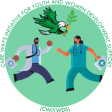Implementing Partner: American University of Nigeria (AUN)
Support Organization: Care Ways Initiative for Youth and Women Support Development
In the face of climate security challenges, vulnerable groups like youth and women often bear the brunt of socio-economic hardships. To address this, the American University of Nigeria (AUN) in collaboration with the Care Ways Initiative, held a one-day workshop aimed at supporting youth and women survivors in their socio-economic recovery journey. Held at Michika Primary School, the workshop focused on empowering participants with the tools needed to build sustainable livelihoods.
Workshop Objectives
The workshop aimed to provide vulnerable youth and women with access to opportunities that would enable them to start or strengthen their businesses. Specifically, the training focused on:
Enhancing participants’ understanding of business development planning.
Offering essential knowledge in financial literacy, including budgeting and financial planning.
Equipping participants with the skills needed to outline their business ideas and implement effective marketing strategies.
Background
Many individuals in Michika and surrounding areas face significant barriers when trying to start or expand their businesses. Lack of business experience and resources are common hurdles that limit their success. This workshop was organized to address these challenges by equipping beneficiaries with the knowledge and skills they need to transform their ideas into viable business ventures.
Key Highlights
The workshop’s agenda was centered around business development planning and financial literacy. Participants engaged in interactive sessions that guided them through the essential elements of drafting a business plan, such as understanding target markets, financial projections, and marketing strategies.
Some of the key outcomes included:
Basic Business Knowledge: Participants gained a strong foundation in business development, from planning to marketing.
Confidence Boost: By the end of the workshop, participants expressed increased confidence in their ability to start and manage a business.
Self-Efficacy: The workshop fostered a sense of empowerment among participants, encouraging them to assert their rights and contribute to positive change in their communities.
Impact and Achievements
The workshop succeeded in training 25 participants, including 10 women and 15 men, with 4 participants from women-led organizations. The training catered to individuals from Michika, Bazza, and Kuzum, with the following breakdown of participants:
Age Groups: 14 participants were between 18-25 years, 9 participants were between 25-35 years, and 2 participants were over 35.
Sector Representation: Participants were drawn from a diverse range of sectors, including government agencies, NGOs, CSOs, and academia.
Conclusion
By the end of the workshop, participants were equipped with valuable skills to take the first steps towards business success. With a strong understanding of financial literacy, planning, and resource management, they are now better positioned to overcome the challenges of entrepreneurship in a climate-affected region.
As communities work towards rebuilding their livelihoods, initiatives like this one serve as critical building blocks for long-term recovery and resilience.

